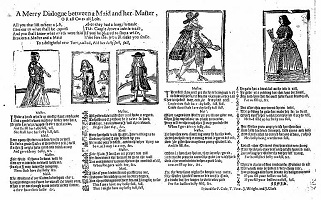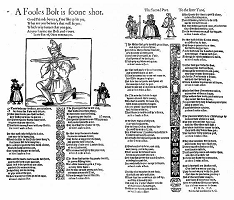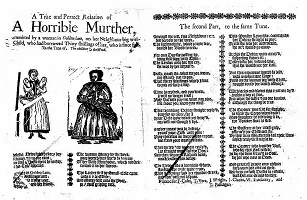Representation of Faithless Women
For centuries in western culture, a typical stereotype held that women were manipulative and conniving. The biblical story of Eve and her manipulation of Adam concerning the fruit of the Tree of Knowledge extended to all women an essentially flawed nature. This "A Merry Dialogue between a Maid and her Master" ballad reflects this notion by ridiculing a bargain made between a maid and master. Here the maid does not know her place: she assumes a masculine role by bargaining with her master, but also transgresses by assuming a role of equality with her master. The reader or listener would laugh, but also understand the cautionary tale of what happens when a man and a master does not police his household. Such ballads reflect concerns with social and gender order.
Intriguingly, authors seemed preoccupied with exchanges between a housemaid and her master. For example in:

The traditional, patriarchal world of early modern England placed men in a position of dominance, in all areas of the public sphere. This dominance, logically, extended to the private sphere of the household. While this order reflected the prescribed ideal, the reality was often very different. Broadside ballads acted to regulate male, as well as female behavior by policing gender roles. A man who seemed unable to control his women looked weak. A man betrayed by his wife became the object of ridicule. They had control not only of the government but also in the house. I argue that authors of the ballads kept men in their typical places of power unless it came to a woman betraying a man and making him look weak. One example is in "A Fooles bolt is soone shot:"
"He that doth early rise each morne, and worketh hard all day, When he comes home can not come in, his Wife is gone to play; And lets her to drinke and spend all the moneys which he got,"As this verse makes clear, the wife receives the most scorn for not preforming her wifely duties by leaving the husband to fend for himself. The ballad author relies on a typical stereotype of women as spendthrift who will drive her husband into the poor house for spending his money on alcohol. This verse does not allow the husband off the hook. Implicit in this criticism of the wife is the understanding that a husband who lets his wife run around in such a fashion, lacks control of his own household. A man who is unable to control his wife shakes the order of society to its very core. The family structure as Amussen examines the same structure that is used for the government and for the Kingdom of Heaven. Such disorder at the lowest levels of society would reverberate through the entire social structure and government, causing disorder (Amussen, 118).

In "A most excellent and famous ditty of Sampson Judge of Israel" much like "A Fooles Bolt is soone Shot" in that a woman is not doing her duty as a wife, which undermined her husband's authority. The broadside author explains that Sampson's wife untrue to him.
"But wisht with them he there did stay, His wife forsooke him quite, And tooke another to her Love, Because his wife did him deny, they killed her."
The author describes Sampson's wife as a disobedient and disloyal wife. She not only denied her husband but also took a lover. This plays into the stereotype of women being distrustful and disloyal. This also plays on the well-worn notion that women could easily be led astray and were ruled by their desires. Much like in the ballad "A Fooles bolt is soone shot" the wife's behavior undermines the husbands authority, and in the case of Sampson, leads to ruin, death, and the destruction of society. In contrast to the first ballad, Sampson on a note of strength: Delilah dies for her misdeeds. This ballad also shows the idea of cuckolding, which as Susan Amussen explains is used either when a woman beats her husband or is unfaithful to him (Amussen, 118). Cuckolding was often accompanied by those of the village making up mocking songs that how the man was cuckolded. In addition, to these ballads showing what happened when a man could not control his wife. These ballads often mocked the men who could not control his wife. This was an effective way to police proper gender roles at this time. This ballad author helped to instill a fear into men that if they were ever cuckolded they would be found out and mocked.

In "A True and Perfect Relation of a Horrible Murther" the author shows women in many unnatural ways. The two women of this ballad are borrowing and lending money, which shows the reality that women do conduct business. The author depicts the Jewish lender as unnatural because she charges interest, which is against Christian doctrine. The author then depicted the Jewish woman as monstrous as she murders the pregnant woman who did not pay back her debt. A woman murdering in general goes against the norm, but a woman who murders a woman and her unborn child is shown as worse. This shown as monstrous because most women at this time were either mothers or would be mothers, and if they show no regard other women's children it bring into question how they care for their own. The broadside author ends the ballad by saying:
"God grant all people may abstain such wretched acts as these, And keep us such Deeds to refrain, least Hell our Souls do seize."
The author suggests that both women were at fault for borrowing and lending money and will go to Hell, even the woman who was murdered. This again polices the idea of what is acceptable for women and puts out the message that if a woman does not live up to the ideal this may cause her soul to rot in Hell for eternity.

